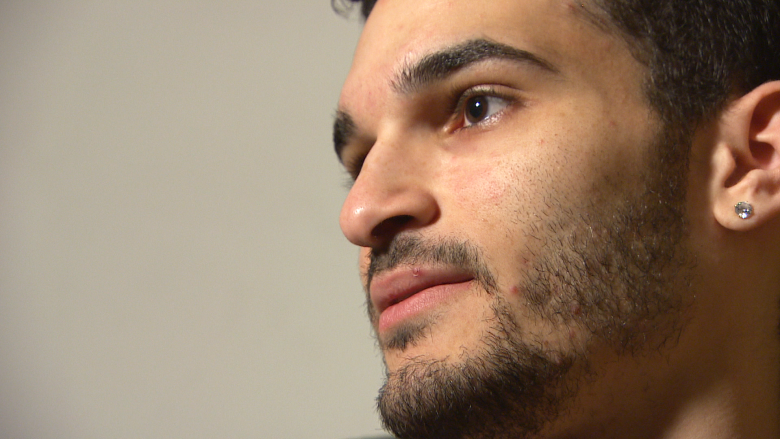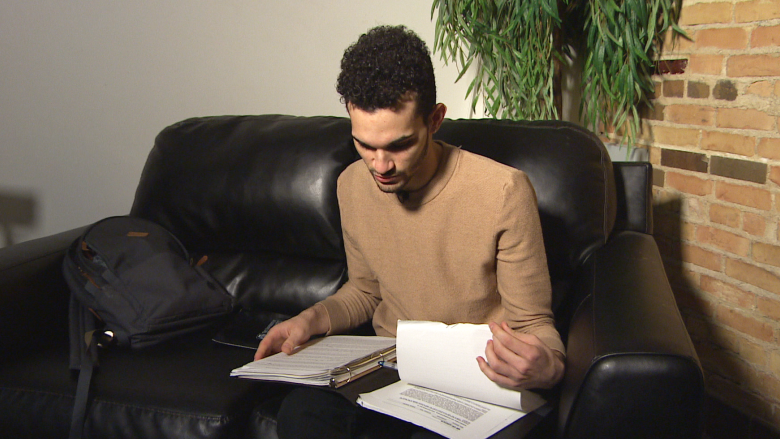'I'd rather die than go there': Gay Egyptian seeks asylum
Samer Habib goes through the binder of paperwork he hopes will allow him to stay in Canada.
It contains his passport, his story, school transcripts, a work permit and news articles explaining what happens to gay men, like him, in Egypt.
Habib, 23, has started the immigration process under the Manitoba provincial nominee program, but his Egyptian passport will expire in June. He's now preparing to apply for refugee status because he is afraid to go back to Egypt to renew his passport.
The 23-year-old gay man said when he thinks about having to go back to Egypt, he is afraid.
"It puts a lot of fear and it makes me feel like my life is in danger," Habib said.
Habib became a student at the University of Winnipeg about five years ago and had a student visa. After graduating, he received a post-graduation work permit for his job as an office assistant at the university.
He began applying to immigrate under the provincial nominee program and was approved for the next steps in January, but learned that it could take 16 months for his application to go through.
There is one large hurdle in the way — his Egyptian passport is set to expire in June.
To have his passport renewed, Habib would have to return to Egypt and complete three years of mandatory military service.
"I don't feel safe. Like, what's going to happen in the next few months if I have to leave the country?" Habib said.
Particularly because he is a gay man, he fears his life will be in danger.
'Impossible to be publicly gay'
"It's impossible to be publicly gay where I come from," he said.
While homosexuality in private is not against the law, other laws regarding debauchery, indecency and prostitution have been used to prosecute gay men, said Winnipeg immigration lawyer Bashir Khan. People found guilty under those laws can face five years of imprisonment and heavy fines.
Human Rights Watch said in a 2016 report that forced anal examinations are used regularly in prosecuting homosexual sex.
Habib said in Egypt, the police and military patrol gay websites like Grindr and some people believe gay people are diseased and sinful.
"It can ruin your entire life there" if people even suspect you are gay, Habib said.
He has only come out to his father, who told him to never speak about it again and threatened to silence him if he does, Habib said.
Habib is most afraid of what could happen to him if he has to join the military.
"I'd rather die than go there because, to me, it's like being a slave but also a prisoner at the same time," he said.
If the military suspects a person is gay, "they decide what they want to do with you next," he said.
"It could be putting you in jail, putting you in a room, abuse, humiliating you or ruining your reputation," he said.
"They could take away my passport, they could take away all my IDs and say, 'There you go, you can't live your life anymore.'"
Applying for asylum
Habib is applying for asylum on two grounds: membership of a particular social group and political opinion, Khan said.
"If he says, 'I refuse to be in the military,' and if he is required under Egyptian law to be conscripted into military service, his refusal to do so is seen as an act against the Egyptian state," Khan said.
"That is how the government would crack down on him very hard and punish him."
Although Habib has been in Canada for years and not filed a refugee claim, he still has a right to do so, Khan said, because only now has deportation become an immediate danger.
"Now is when his fears have come to life," Khan said.
Habib will compile all of the documents in his binder containing his hopes and fears for the future into a claim he will file next week.
If he qualifies, it will be at least two months until he has his hearing.
Habib said he can't sleep thinking about what will happen if the judge doesn't support his claim.
"That just scares me just as much as what's waiting for me back home," he said.
"And I don't know what's going to happen."




